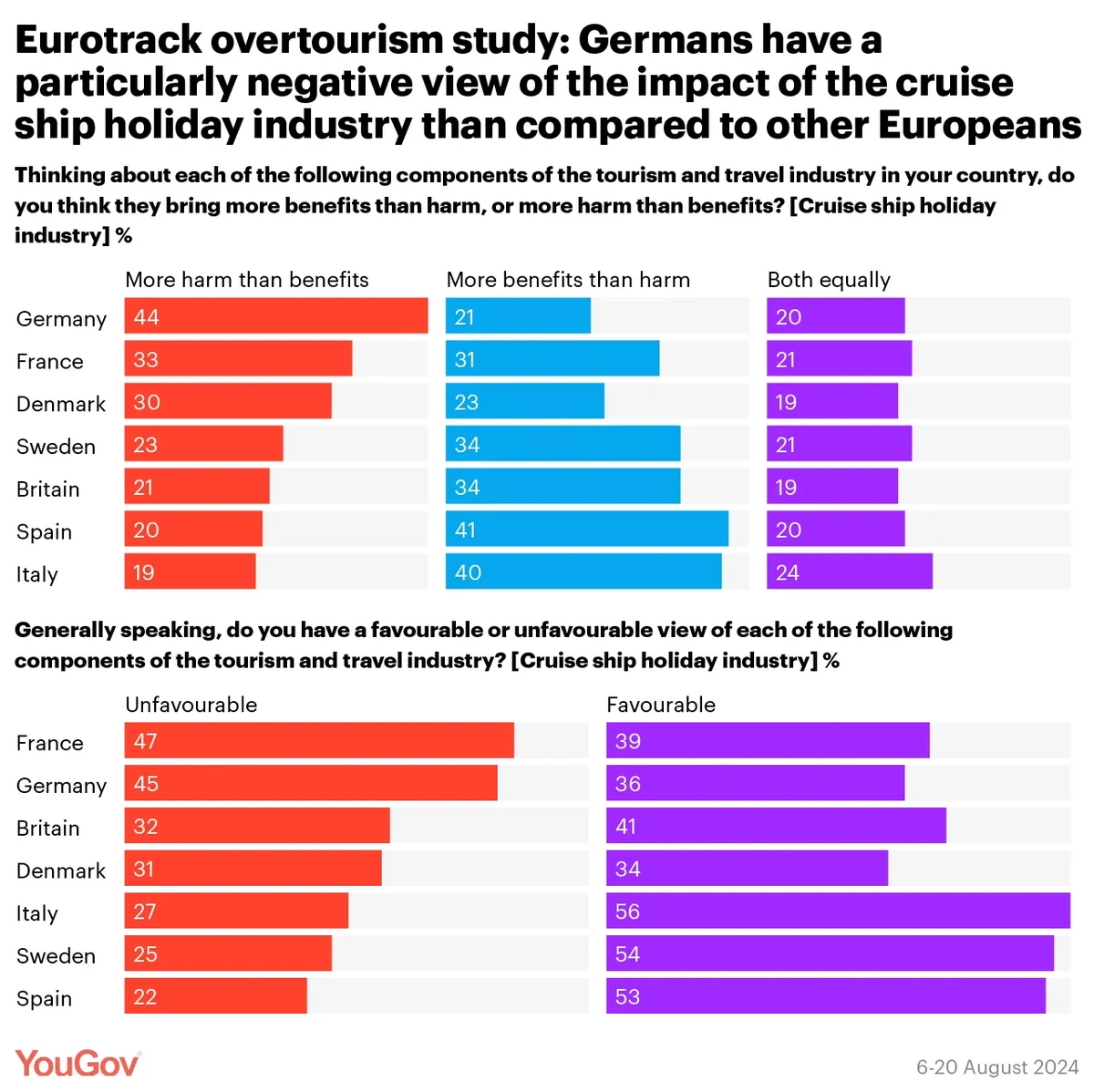People in Spain are particularly likely to feel there are too many tourists in their local area, and take a negative view of the holiday lets sector
Concerns about unsustainable numbers of tourists flocking to popular destinations have been growing in recent years, with locals in places like Barcelona and the Canary Islands protesting the negative effects of “overtourism”. These often include house prices rising to unaffordable levels as homes are bought and converted into holiday lets, as well as wider increases to the cost of living and other resource issues like the strain on water supplies.
Now a new YouGov Eurotrack survey, encompassing Britain, Denmark, France, Germany, Italy, Spain and Sweden, explores Europeans’ attitudes on the subject.
Spain is generally considered to be one of the countries most affected by overtourism, and the results bear this out. Almost half of Spaniards (49%) say there are ‘large’ numbers of international tourists in their local area, with 32% saying that their local area receives “too many” foreign travellers, significantly ahead of second-placed France (18%). In Italy, another country commonly held to face overtourism problems, 16% of people also say that there are too many foreign travellers in their area.
Among Britons, Danes and Swedes, by contrast, this figure stands at just 5-7%.
Breaking the Spanish results down by region, those living in Catalonia – where Barcelona is located – are the most likely to say that there are too many tourists, at 48%. (Our sample of Spaniards in the Canary Islands).
Likely in part due to these overtourism issues, a sizeable minority of people in Spain (28%) now say they have a negative view of international tourists in their country. This is again noticeably ahead of second-placed France, where 16% have an unfavourable view, followed by 14% of Germans, 13% of Britons and 11% of Italians. Swedes are the least likely to have a negative view of foreign travellers, at 6%.
Many Spaniards take issue with the holiday rental sector, while many Germans are sceptical about the cruise holiday industry
Looking at attitudes towards various parts of the tourism industry, the holiday rental properties sector stands out as provoking particular ire in Spain. The Spanish government has recently announced a crackdown on such properties, and the city of Madrid has announced it is pausing the granting of new licences for tourists flats.
Our results show that more than a third of Spaniards (37%) say that the holiday lets industry brings more harm than benefits, and 45% of Spaniards have a negative view of it.
In comparison, Britain holds the second-most negative attitudes to the industry, but this only amounts to the much lower rate of 21% seeing it as primarily harmful and 33% seeing it in negative terms.
Spanish negativity towards the holiday rentals sector does not extend to the hotel industry, which only 21% have a negative view of, a comparable rate to other countries like France, Italy, Germany and Britain (18-19%).
Another area of the travel sector that often comes in for criticism is the cruise ships industry. In this case, Spaniards actually have among the most positive views of big boat tourism – but it is a different story in Germany. More than four in ten Germans (44%) say the industry brings more harm than benefits – more than twice the figure who hold the opposing view (21%) – while 45% have a negative view of the industry. French people are similarly likely to have an unfavourable opinion of the cruise industry (47%), although are less likely to think it is primarily harmful (33%).

Attitudes to the inbound, outbound and domestic tourism industries, as well as the hotels sector, are positive among the majority in each country, with the airlines industry also generally favoured across the board.
What measures to tackle overtourism would Europeans support?
Overtourism protestors in Barcelona grabbed headlines around the world by squirting tourists with water pistols. Europeans claim not to be indifferent to the protestors’ concerns, with a majority in each country surveyed saying they have either a “great deal” or a “fair amount” of sympathy for residents of popular tourist destinations who are protesting about overtourism there, ranging from 53% in Italy to 66% in Spain.
But do these sympathies extend to support for measures to tackle overtourism? Various jurisdictions around the world have proposed or implemented policies designed to ease the issue – so which have public support?
Topping the list is a requirement for tourists to book in advance to get admission to popular sites, a policy in place at attractions like the Colosseum in Rome and the Louvre in Paris. The majority of people in each country (57-76%) say they would support such a move to combat overtourism.
At least half of people in each country (50-62%) would also support setting limits on the amount of tourists that can go to popular cities or destinations, as has been introduced in places like the Acropolis in Athens and Machu Picchu in Peru.
There is also plurality support across the seven countries surveyed for banning the construction of new hotels in popular cities, a measure which Amsterdam announced in April of this year. While support levels dip below 50% in some countries (ranging from 46-58%), in all cases approval significantly outstrips opposition.
Implementing a “tourist tax” fee to enter popular cities – as Venice introduced for day-trippers earlier this year – proves slightly more divisive; although generally more popular than not in most countries, it does split Italians, of whom 45% would support the move while 46% oppose.
Nations differ on prohibiting people in popular destinations from renting out residential properties as holiday lets. While support for such a move sizeably outpaces opposition in Britain, Spain, Denmark and Germany, French people are evenly split, and Italians and Swedes are actively opposed.
Our final policy – banning day trippers to popular cities, as has been floated by the Austrian city of Salzburg – is uniformly opposed in each country. This proposal is particularly unpopular in Britain, where fully 70% are against.
What do you think about overtourism, the holiday lets industry, and everything else? Have your say, join the YouGov panel, and get paid to share your thoughts. Sign up here.
Photo: Getty









